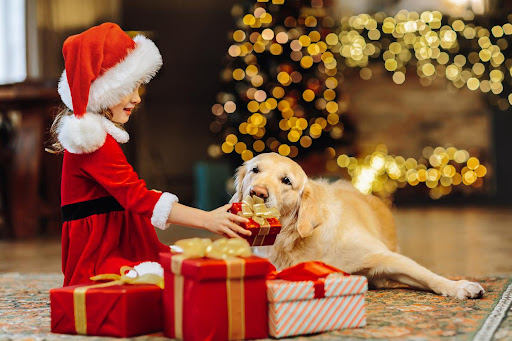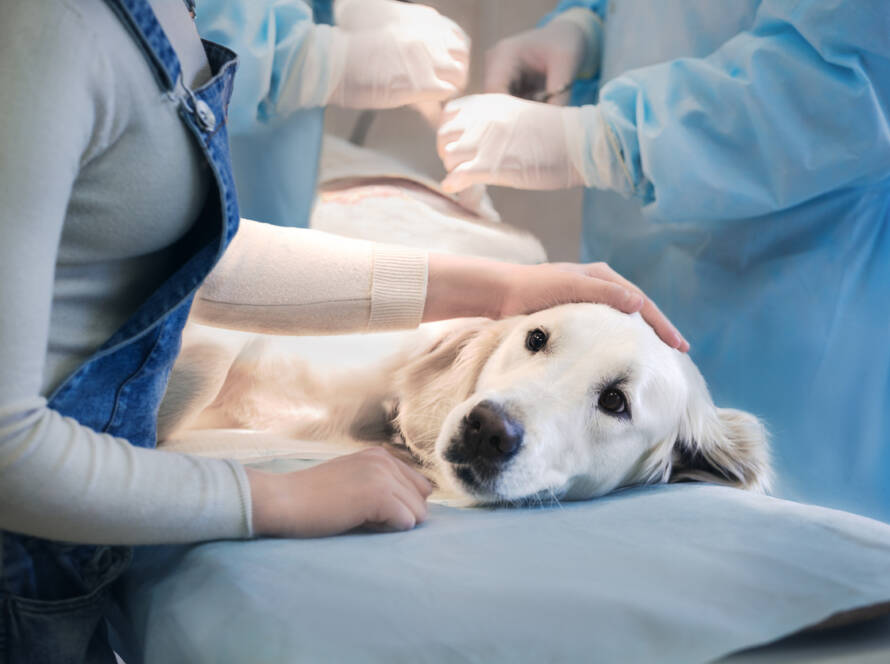The holidays are in full swing here in Schoolcraft, Michigan, bringing festive cheer and cozy gatherings. Celebrating with family, friends, and our beloved pets is beautiful. But with all the seasonal treats, sparkling decorations, and fun in the snow, it is important to remember safety tips for our furry companions. At Schoolcraft Veterinary Clinic, we have unwrapped our top Holiday Pet Safety Tips So you and your pets can enjoy a safe and joyful season together!
1. Holiday Pet Safety Tip: Festive Foods That Are “Naughty” for Pets
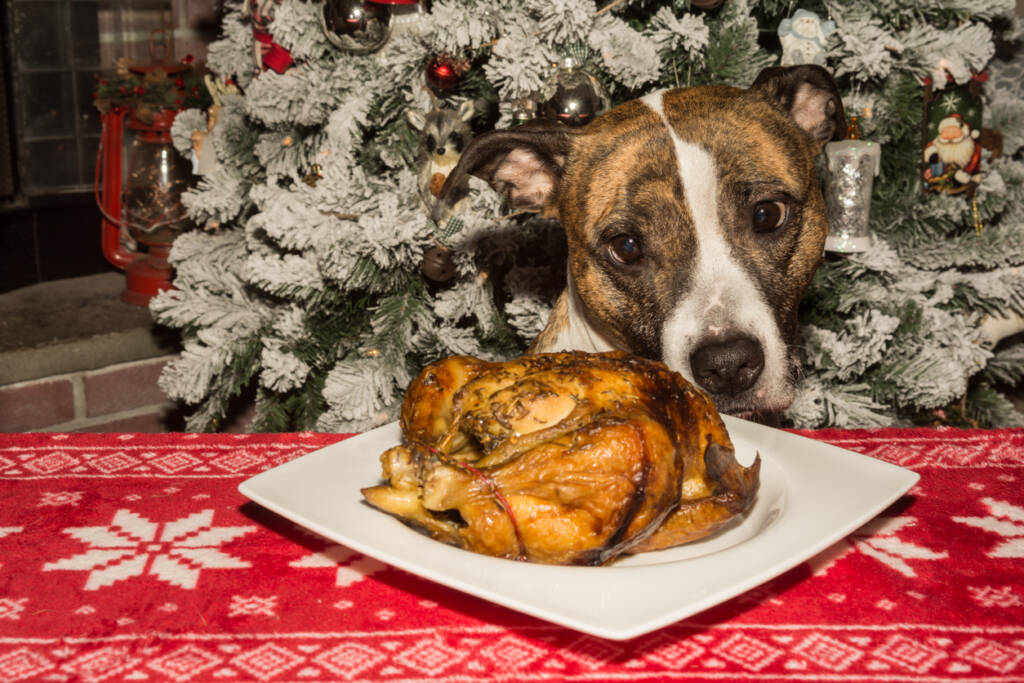
We know you would love to share holiday treats with your pets, but some seasonal favorites are very toxic for them and, if ingested, would require an emergency trip to a veterinarian and could result in death. Here are the leading dangers:
Chocolate – Chocolate contains theobromine and caffeine, which are highly toxic to pets. Symptoms of chocolate poisoning include vomiting, diarrhea, restlessness, tremors, and, in severe cases, seizures or death. The amount of chocolate that is toxic depends on the type of chocolate, the size of the pet, and the amount that the pet ate. For a small pet, even just a nibble could be toxic for them. Keep your pets safe by keeping all chocolate out of reach—including baking chocolate, chocolate candies, cocoa-based desserts, chocolate milk, and hot chocolate.
Grapes and Raisins – The toxic effects of grapes and raisins can lead to sudden kidney failure in dogs and cats. Even a tiny amount can be dangerous. A general rule of thumb is to be concerned if your pet eats more than 1 grape or raisin per 10 pounds of body weight. Symptoms may include vomiting, lethargy, and loss of appetite within hours. Keep grapes, raisins, and foods containing them, such as fruit salads, fruit cakes, oatmeal cookies, and cinnamon rolls, away from pets.
Macadamia Nuts — These nuts are highly toxic to pets, especially dogs. Even a small amount can lead to symptoms like weakness in the hind legs, vomiting, tremors, fever, and lethargy. Symptoms typically appear within 12 hours and can last up to 48 hours, often requiring veterinary care.
Xylitol – Commonly found in sugar-free candies, gum, and some baked goods, xylitol can cause a sudden, life-threatening drop in blood sugar (hypoglycemia) in pets. Symptoms include vomiting, weakness, tremors, and seizures. Xylitol can lead to liver failure, which can be fatal.
Onions, Garlic, and Chives – These seasonings are abundantly used in holiday meals such as:
- Turkey, Duck, or Goose
- Prime Rib or Roast Beef
- Pork Roast, Ham or Sausages
- Sides – stuffing, gravy, mashed potatoes, roasted veggies, green bean casserole
Onions, garlic, and chives contain compounds that can damage a pet’s red blood cells, leading to anemia. Symptoms of toxicity include vomiting, abdominal pain, lethargy, and weakness, though these effects may take days to appear. Even small amounts can be harmful, so do not feed pets foods that may contain onions, garlic or chives.
While you must keep the above holiday foods away from pets, there are still safe and nutritious options they can enjoy!
- Plain, cooked turkey (without skin, seasoning, or bones)
- Small amounts of plain, unseasoned and unsweetened sweet potatoes, carrots, green beans, or pumpkin (not pumpkin pie filling)
- Apple slices, blueberries, cranberries (unsweetened)
Just remember to keep portions small to avoid tummy troubles and skip any foods with added sugar, spices, or butter. With a few simple choices, you can safely let your furry friends join in the holiday feast!
2. Holiday Pet Safety Tip: Decorations They’ll Try to “Un-Deck”
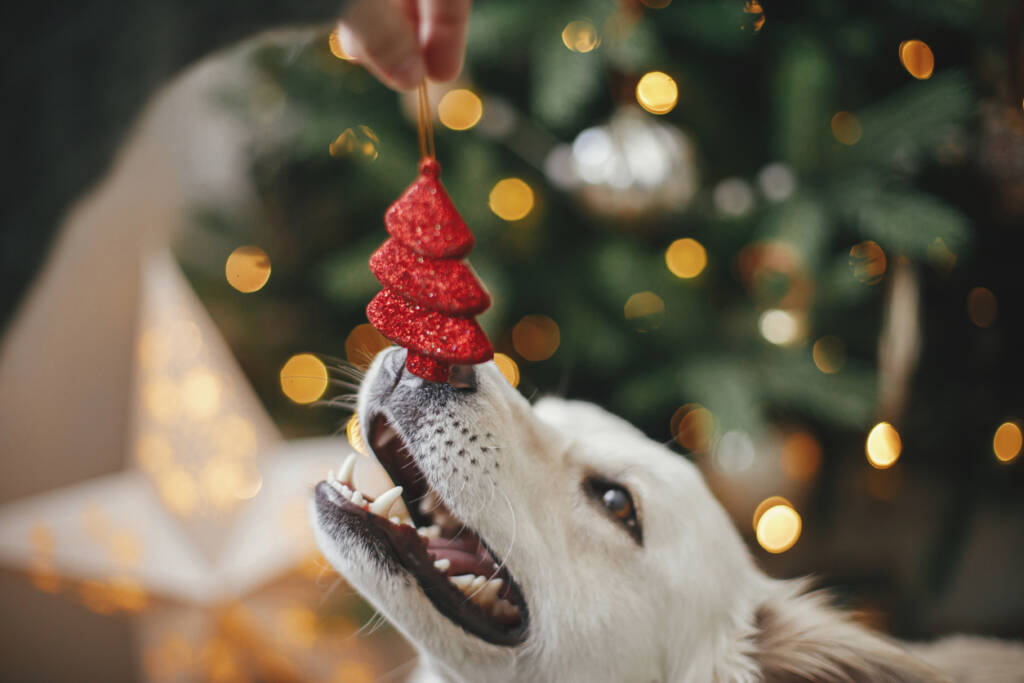
Pets love shiny, jingly things as much as we do! Here is how to keep them out of decoration danger:
- Tinsel and Ribbon – Cats find tinsel and ribbon irresistible, but it can lead to scary stomach issues if swallowed. If you have curious kitties or pups, keep them away from the tree or skip the tinsel and ribbon altogether.
- Ornaments – Use shatter-proof ornaments.
- Electric Cords – Protect cords from curious chewers with pet-safe covers. Pets may get attracted to Christmas light cords. Electrical shock may occur when a pet bites down on an electrical cord, causing deep cuts or tears in its tongue, severe respiratory issues, and possible death. Use a grounded three-prong extension cord as a safety precaution. Unplug Christmas tree lights when you are not around to supervise your pets. You can also purchase cord protectors such as the Chewsafe Cord Cover, PetCords Dog & Cat Protector.
3. Deck the Halls—But Watch Out for Toxic Plants!
Some holiday plants are beautiful, but they are better kept out of paw’s reach:
- Poinsettias – Mildly toxic and might cause a little drool if nibbled, but not as severe as mistletoe or holly.
- Mistletoe and Holly – These two pack a more potent punch, causing stomach upset and heart issues. If your pet gets under the mistletoe, just give them a kiss and keep it pet-safe.
- Lilies – These beauties toxicity to pets depends on the type of lily. but can pose serious risks to pets. While some lilies cause mild reactions in dogs, they are highly toxic to cats. Even small exposures can be life-threatening for felines. Here’s what you need to know:
Lilies Toxic to Both Dogs and Cats:
- Calla Lilies: Contain calcium oxalates, which cause oral irritation, drooling, and vomiting in both cats and dogs.
- Peace Lilies: Contain the same irritants, leading to similar symptoms of mild toxicity for both species.
- Peruvian Lilies (Alstroemeria): Can cause gastrointestinal upset if ingested, affecting both cats and dogs, though symptoms are usually mild.
- Lily of the Valley: Extremely dangerous to cats and dogs. Contains cardiac glycosides, which can cause vomiting, diarrhea, slowed heart rate, seizures, and even death.
True Lilies Extremely Dangerous to Cats:
True lilies, such as Easter lilies, Tiger lilies, Asiatic lilies, and Stargazer lilies, are highly toxic to cats. Even minimal exposure, like licking pollen or drinking water from a vase, can cause:
- Acute kidney failure
- Vomiting
- Lethargy
- Loss of appetite
- Death if not treated immediately
These lilies are less harmful to dogs, usually causing mild gastrointestinal upset.
Play it Safe: Beautiful Holiday Pet Safe Alternatives to Toxic Plants
- Red Roses instead of Poinsettias
- White Orchids instead of Lilies (While orchids are generally safe, they can cause an upset stomach if a dog eats a significant amount. So keep orchids out of reach)
- Achira instead of Amaryllis
- Autumn Olive instead of Holly
4. Holiday Pet Safety Tip: The Case of the Toppling Christmas Tree
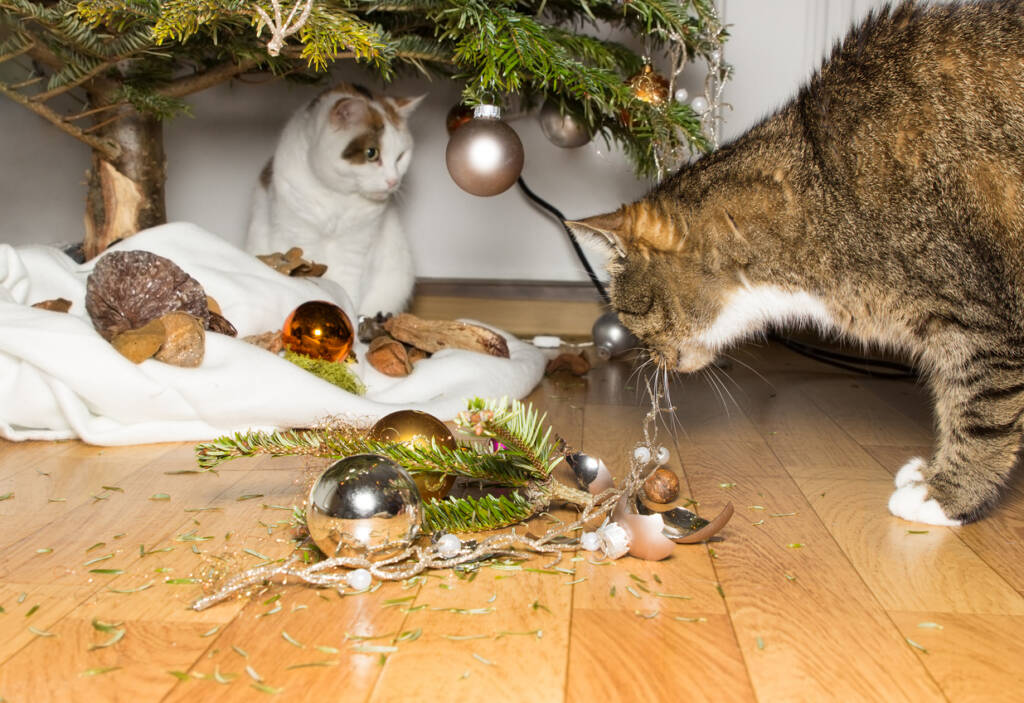
Ah, the Christmas tree—a sparkling centerpiece for humans, climbing challenge for cats! Keep your tree pet-safe by:
- Securing the Tree—Anchor the tree securely to avoid the “falling forest” effect, just in case your cat decides it’s their personal jungle gym.
- Tree Water is tempting to some pets, but it is often full of fertilizers and other chemicals. To protect curious noses, cover the water or keep it off-limits.
- No Munching on Pine Needles – These aren’t edible! Pine needles can irritate your pet’s digestive system, so sweep up any that fall.
5. Holiday Pet Safety Tip: Hazardous Flames, Scents, and Holiday Ambiance
Warm, cozy candles and holiday scents bring cheer but need to stay pet-safe:
- Candles – For a pet-friendly glow, go with flameless candles. Real flames are a “no” around wagging tails and curious noses!
- Essential Oils – These oils are made from highly concentrated plant sources and are listed by the AVMA as a pet hazard in the home. Festive simmer pots are pet-friendly festive alternatives to using essential oils in your home during the holidays. Create cozy holiday scents by simmering pet-safe ingredients like cinnamon sticks, apple slices, cranberries, and fresh rosemary or thyme. Add a splash of vanilla extract for extra warmth. Avoid using nutmeg or clove, as they can be harmful to pets.
- Fireplaces – Keep pets safe around fireplaces by using a sturdy screen or glass doors to prevent curious paws from getting too close to the flames. Never leave pets unsupervised in a room with a lit fire, as sparks and embers can pose a burn hazard. Additionally, ensure the area surrounding the fireplace is free of pet beds, toys, or other flammable items.
6. All That Glitters Is Not Good for Pets
Once the presents are unwrapped, ensure leftover ribbons, bows, string, and wrapping paper don’t become chew toys. As mentioned above, ribbon and string can cause serious stomach and intestinal problems, especially for cats. If a piece of ribbon or string gets stuck (often at the base of the tongue or in the stomach) and the intestines try to push it along, the material can cut into the intestinal walls, causing severe damage or even life-threatening tears. Emergency surgery is often needed to fix this, so it’s crucial to clean up ribbons, strings, and similar items quickly to keep your pets safe.
7. Give Them a Cozy “Holiday Hideaway”
The holiday hustle and bustle can be stressful for some pets. If your pet is fearful of strangers, set up a quiet, comfy space just for them. With their favorite bed, toys, and maybe a calming treat or two, they’ll have a place to relax when things get too jolly.
8. Know Who to Call for Pet Emergencies
Despite our best efforts, holiday mishaps can happen. Keep the following numbers handy in case of an emergency:
- Pet Poison Helpline: 855-764-7661
- Schoolcraft Veterinary Clinic: 269-679-5248
AFTER HOURS EMERGENCY:
- Southwest Michigan Animal Emergency Hospital: 269-381-5288
- Animal Emergency and Specialty Hospital: 616-361-9911
9. Holiday Pet Safety Tip: Protect Your Pets from the Cold Weather
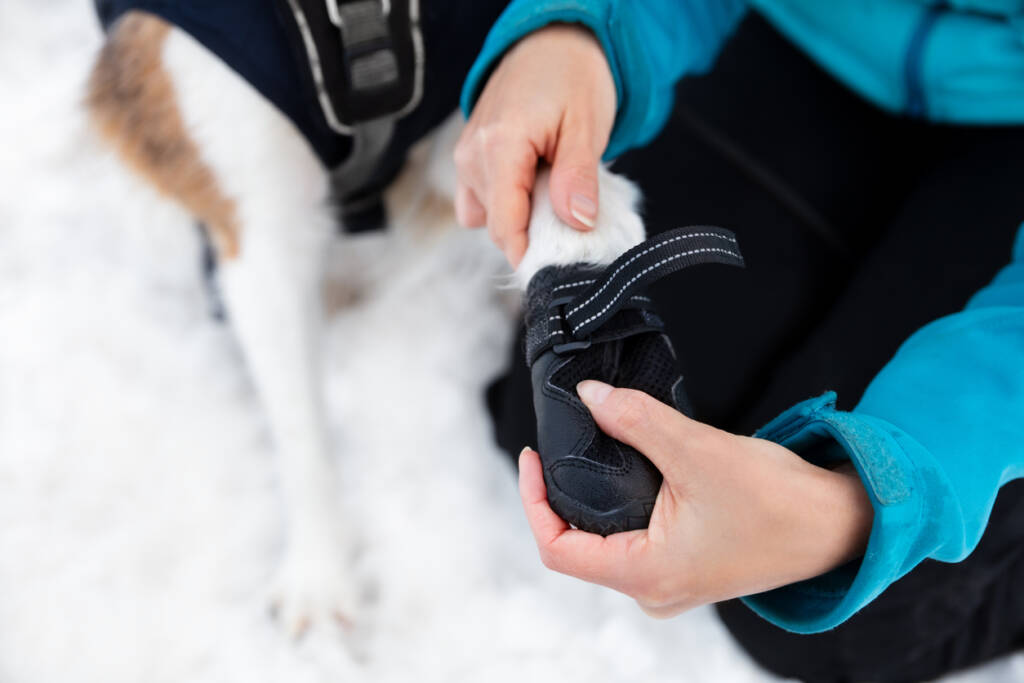
A pet’s cold tolerance can vary from pet to pet based on their coat, body fat stores, activity level, and health.
Long-haired or thick-coated dogs tend to be more cold-tolerant but are still at risk in cold weather. Short-haired pets feel the cold faster because they have less protection.
Pets with diabetes, heart disease, kidney disease, or hormonal imbalances (such as Cushing’s disease) may have difficulty regulating their body temperature. They may be more susceptible to problems from temperature extremes. The same goes for very young and older pets. Consult your veterinarian if you need help determining your pet’s temperature limits.
We recommend always keeping cats inside. Accompany your dog outdoors when they need to relieve themselves or get exercise. Keep in mind that if you feel cold and want to go back inside, your pet is getting cold, too. Here are some additional tips for taking your dog outside:
1. Let your pet’s coat grow.
Never shave your dog or cat in the winter. A longer coat will provide more warmth. If your dog is short-haired, you can consider getting him a coat or sweater with a high collar or turtleneck with coverage from the base of the tail to the belly.
2. Bathe your pets as little as possible during cold spells.
Washing too often can remove essential oils and increase the chance of developing dry, flaky skin. If you need to bathe your pet, ask your vet to recommend a moisturizing shampoo or rinse.
3. Protect their paw pads.
You can purchase paw balms to rub onto your pet’s pads before going outside to protect them from the cold. Booties provide even more coverage if your pet will wear them.
4. Watch for signs that your pet may be getting too cold.
If your pet is whining, shivering, appearing anxious, slowing down or stopping, or looking for a warm place to burrow, you need to bring them inside.
5. Wipe your pet with a towel immediately when they come in from the outside.
Repeatedly coming into the heat of your house after being out in the cold can cause itchy, flaking skin. Towel-drying your pet as soon as they come helps prevent dry skin.
6. Be Watchful for Coolants or Antifreeze
Coolant or antifreeze is a lethal poison for dogs and cats. Unfortunately, both dogs and cats are attracted to its taste. You must thoroughly clean up any spills from your vehicle and consider using products that contain propylene glycol rather than ethylene glycol.
Wishing You and Your Pets a Safe and Joyful Holiday Season!
With these Holiday Pet Safety Tips, you can enjoy a season full of love and laughter without worry. If you have questions or need to schedule an appointment, please do not hesitate to contact Schoolcraft Veterinary Clinic. Happy holidays to you and your furry family members!
Your Friends at Schoolcraft Veterinary Clinic

